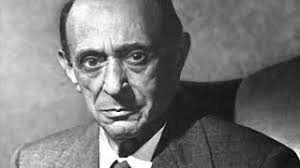Arnold Schoenberg was born on September 13th, 1874, in Vienna, Austria.
阿诺德·勋伯格1874年9月13日出生于奥地利维也纳。
Largely self taught from an early age, Schoenberg began studying composition and learned how to play the violin by the age of 8, later going on to teach himself how to play the cello.
勋伯格从小就自学成才,8岁时开始学习作曲,学习小提琴,后来又自学大提琴。
One of his earliest musical mentors was a composer and conductor by the name of Alexander von Zemlinsky,
他最早的音乐导师之一是一位作曲家和指挥家,名叫亚历山大·冯·泽姆林斯基,

with whom he studied counterpoint, and whose sister would later go on to be Schoenberg’s first wife.
他和老师一起学习对位法,后来这位老师的妹妹成为勋伯格的第一任妻子。
Schoenberg’s stamp on the progression of music history was profound.
勋伯格对音乐史发展的影响是深远的。
His approach towards the development of atonality and increasing use of chromaticism eventually lead to the formation of his theories concerning twelve-tone composition.
他对无调性的发展和对色度学的日益广泛的运用,最终导致了他关于十二音创作理论的形成。
During a time of extreme Romantic dissonance, Schoenberg’s new system of musical composition was considered so radical
在一个极端浪漫主义的不和谐时期,勋伯格的新的音乐创作体系被认为是激进的,
that it was rejected by even some of the most avant-garde composers, although the fundamental idea of a serial language for music was embraced.
甚至被一些最前卫的作曲家所拒绝,尽管音乐连续体语言的基本理念被接受了。
Schoenberg was highly superstitious, so much so that his composition, “Moses und Aron” was deliberately spelled this way so as to avoid the unlucky number of 13 letters.
勋伯格非常迷信,以至于他故意将自己的作品名字“摩西与亚伦”拼写成Moses und Aron,以避免13个字母的不幸数字。
It has been said that Schoenberg’s superstitions lead him to foretell his own death, which eventually became true
有人说,勋伯格的迷信使他预言自己的死亡,并最终成为事实,
when he died on July 13th, 1951, of heart failure at the age of 76.
勋伯格在1951年7月13日死于心脏衰竭,享年76岁。












